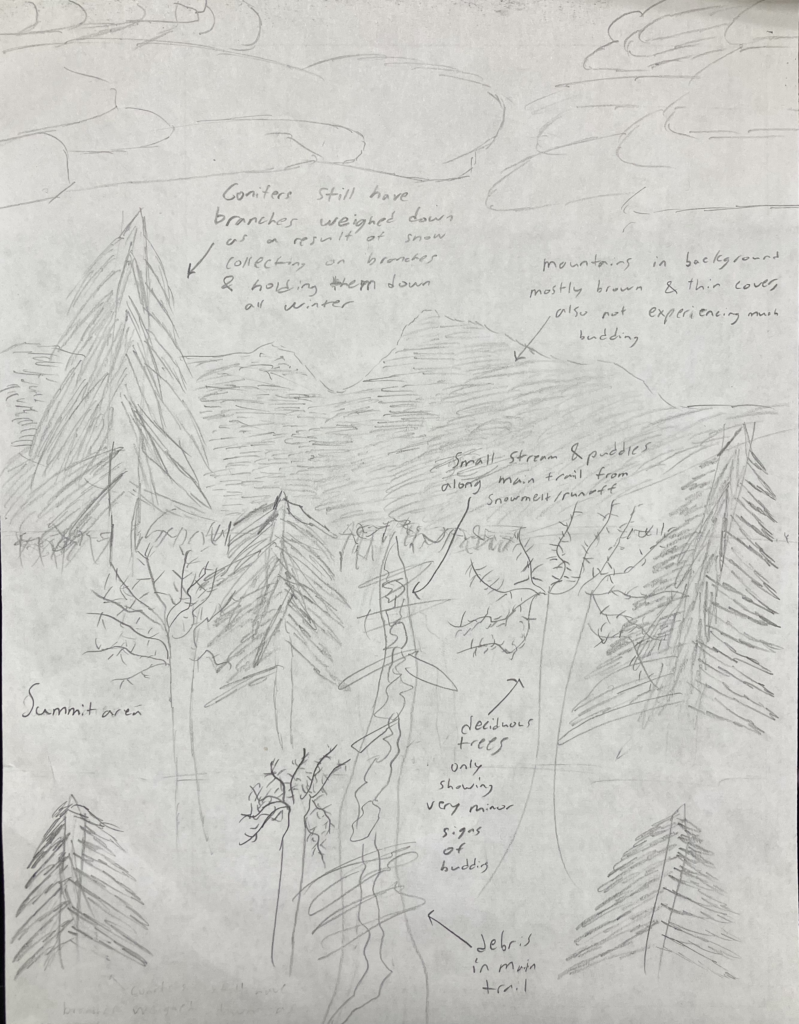The main peak of the Bolton Valley backcountry area experiences the seasonal changes that come with spring much later than other parts of Vermont at lower elevations. I was able to hike up the Bolton Valley skin track this past weekend and I noticed a theme of increasingly wet conditions as elevation increased. Hiking the skin track during mud season is certainly one of the less common activities to do in Vermont and there were only a handful of human footprints. However, the footprints and tracks that were present were all very distinct and noticeable considering the trail was so immensely muddy and the slightest presence of a human or animal would leave a significant impact. Farther off the main trail and into the woods I noticed that the ground itself was undoubtedly experiencing the impacts of mud season as well but not to the degree that the main trail was experiencing. This shows how trail creation removes vegetation that can absorb and uptake water from the ground, causing moisture to collect and become considerably more concentrated in areas that are cleared out. The impact of human-made trails is less noticeable in times other than mud season when the ground is either fully dry or snow covered, but mud season is the one time of the year where the impacts of trail construction on water drainage is very noticeable. This all suggests that the backcountry recreation aspect of Bolton likely has little environmental impact during winter when vegetation is dormant and snow cover is abundant, but during mud season it is obvious that human made trails are significantly more delicate than natural woods.
I mainly visited the Bolton backcountry area over the winter and only visited during the freeze-thaw mud season once. Over the winter it was difficult to gauge changes because of the sheer amount of snow covering any sort of fallen debris and it was also difficult to gauge the amount of snow present during each visit as well. Despite this, I can confidently say that when the ground is bare in the backcountry area it is clear that there is an immense amount of fallen debris. Some of this debris may be from storms just this past winter, but I have to assume that most debris is a result of years of storms and buildup. The backcountry area is not maintained for summer use at all, leading to a network of trails that appear full of downfall and are occasionally difficult to navigate during times of bare ground. However, this also suggests that the lack of human activity in the summer may be good for the overall health of the forest, seeing as vegetation and wildlife can experience seasonal change and development without any human intervention.
The most notable landmarks in the area for me are probably similar to many other Bolton backcountry visitors: major viewpoints, significant forks and intersections in the network, occasional man made structures, and so on. I haven’t spent enough time exploring the less notable hidden gems of the Bolton area, and while the areas I’ve become familiar with are still quite special to me, I haven’t ventured around enough to become fully in tune with the area. Furthermore, I would not consider myself a part of my place, only a visitor. I only traveled to Bolton on the occasional weekend over the last few months, which I believe is barely enough time to consider myself acquainted with a place, let alone an entire part of a place. It’s difficult to consider myself a part of a place that I see not as a home but only as an area to visit occasionally. I’ve spent a lot of time exploring the Burlington area over this past year, but I still wouldn’t consider myself a part of any place but campus itself for now. Being on campus for the majority of my time makes it difficult to really be in tune with a more natural area. I hope to one day live in a place where I’m out of an urban area and I’m instead able to spend most of my waking hours experiencing the minor parts of nature that take immense time to experience and comprehend. I’m not a part of the Bolton area by any means right now, but I hope I can know what it’s like to be truly part of a forest one day.

